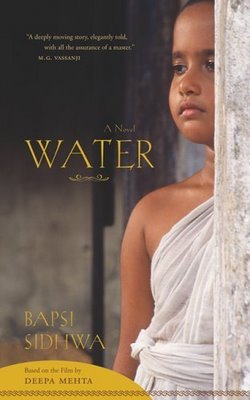The Widows of Water

The novel Water (2006) by Bapsi Sidhwa depicts the dire sufferings of Varanasi widows in pre-independent India. The major issues depicted in the movie are prostitution, child marriage, widowhood, superstitious beliefs, blind Indian traditions and customs. Sidhwa successfully shows that Indians in the twentieth century suffered a lot mainly due to the imposed cultural heritage of India than the colonial invasion.
The predominant theme of Widowhood in India and stinking prostitution go hand-in-hand in Water. Water reflects the Hindu scriptures which says; when a woman's husband dies, she has three options: One, to marry her husband's younger brother, if his family permits; two, to kill herself on his funeral pyre; three, to live a life of celibacy, discipline, and solitude amongst her own kind. It is the third option that many widows take up. In Vrindavan, near West Bengal those widows can be spotted in white saris, shaven heads and eyes with pessimism. They spend their entire lives singing Bhajans and eating only less spices food to reduce their sexual desires. Many of them do not even think of the Widow Remarriage Act since they are illiterate. Even when Narayan mentions about Remarriage, Sakuntala shares that it would be blasphemous for them to complain about their deplorable conditions. Many of them become beggars and some even sell their bodies for winning bread. Kalyani wants to live a happy life with Narayan. But her circumstances lead her to be a prostitute to get bread for all her fellow beings. Madhumati along with a pimp Gulabi sell Kalyani for their materialistic pleasures. They even forget the fact that she is a human with a soul.
Child marriage is a common issue in our developing nation even now. In Water, Chuyia is married to an old man who dies soon. Chuyia is only seven years old and does not know what marriage is all about. It might be the poverty and discrimination against girl child that made Chuyia’s father to marry her off at a tender age. An innocent girl like her is forced to live under the ram shackled roof of widow’s community till her last breath. But, she longs for a better living with her parents in near future. There are many such child marriages still happening in our motherland in the name of religion and caste. According to the infamous Devadasi cult in Karnataka, small girls under the age of ten years are devoted to a deity in a temple there. Essentially, it is the poverty and burden of getting girls marrying off, that lead their kith and kin to ‘gift’ their daughters to the deity. Later, these girls are ‘used’ by the landlords closer to the temple. In Water, Chuyia is sexually assaulted by an unknown lord for his pleasure. For little Chuyia, it is only ‘an act of play’.
Another common problem is superstitious beliefs in Indians. Widows in the novel are given a low status. Anyone who even touches them would be ‘impure’. In Water, Kalyani accidentally touches a lady who comes after taking bath in Temple pond. The lady angrily says Kalyani that it is a taboo for widows to be vibrant. She asserts Kalyani to be calm and quiet in all means. Another instance is when a marriage ceremony happens in the nearby temple, the priest demands Shakuntala to keep herself away from the bride. It is believed that presence of widows will be inauspicious for the couple’s future.
India is well-known for its blind traditions and customs. The water in Water stands as a symbol for purifying one’s own sins and also acts as a rejuvenation agent. Hindu traditions believe that after doing every act of sin one could take a bath in River Ganges and all their sins be taken away before God. Narayan’s father, who sleeps with the widow Kalyani also believes the same. He also distorts traditional beliefs and says a Brahmin can keep anyone has his own mistress. He justifies Lord Krishna’s act of keeping many Gopikas for his won benefit. The movie, henceforth poses a question: “Amid all this water, is rebirth possible or does tradition drown all?”
In a nutshell, Water draws the ugly realities in our country that continue to exist even now.
Comments
Post a Comment